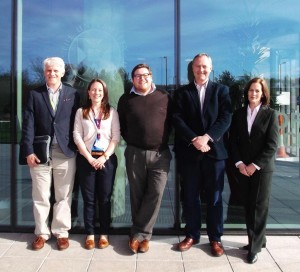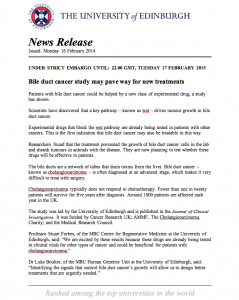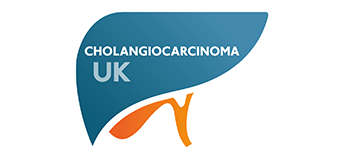A step towards more effective treatments …
AMMF is delighted to see the positive findings of the Edinburgh research the charity has been co-funding published today in the Journal of Clinical Investigation
The Edinburgh team has shown how a molecular mechanism drives the growth of cholangiocarcinoma (bile duct cancer) and that interfering with this mechanism prevented the growth of bile duct cancer cells in the lab, and shrunk tumours in animals with bile duct cancer.
The mechanism, known as the ‘Wnt’ pathway, is already known to cancer experts. It consists of a network of proteins that carry signals inside cells and experimental drugs that block it are already being tested in patients with other cancers.
Dr Alan Worsley, senior science information officer at Cancer Research UK – which co-funded the study – has backed the research and commented,
“This promising study shows that, in animals, bile duct cancer may be especially vulnerable to drugs that block a particular set of signalling molecules.”
Professor Stuart Forbes, of the MRC Centre for Regenerative Medicine at the University of
Edinburgh, said: “We are excited by these results because these drugs are already being tested in clinical trials for other types of cancer and could be beneficial for patients with
cholangiocarcinoma.”

(l to r): The Edinburgh team – Professor Stephen Wigmore, Drs Rachel Guest & Luke Boulter, research scientists, Professor Stuart Forbes with AMMF’s Helen Morement
Dr Luke Boulter, of the MRC Human Genetics Unit at the University of Edinburgh, who led the research, said,
“Identifying the signals that control bile duct cancer’s growth will allow us to design better treatments that are urgently needed.”
This study in Edinburgh gives the first indication that bile duct cancer may be particularly susceptible to these drugs. Plans are now in the pipeline to find out whether the drugs will be effective in patients.
The University of Edinburgh circulated a News Release just prior to the paper’s publication, which included a comment from AMMF’s Helen Morement on the importance of this novel work. To read the News Release, click here
Cholangiocarcinoma is an under-researched, much neglected but truly devastating disease, so it is good to see progress being made in novel areas. We are hopeful that this research work with Wnt will provide a real step forward towards a clinical trial and some long awaited possible improvements in treatment.
AMMF congratulates the team on this discovery which is, potentially, very exciting.
To read the paper published in the Journal of Clinical Investigation in full, click here
To read more about AMMF’s grant towards this research, click here
To hear Professor Stuart Forbes explain this research, click below:
Cholangiocarcinoma – bile duct cancer – is a rare but aggressive type of cancer that affects the network of tubes that carries bile from the liver to the digestive system. It is often diagnosed at an advanced stage, meaning it is very difficult to treat with surgery.
February 2015








